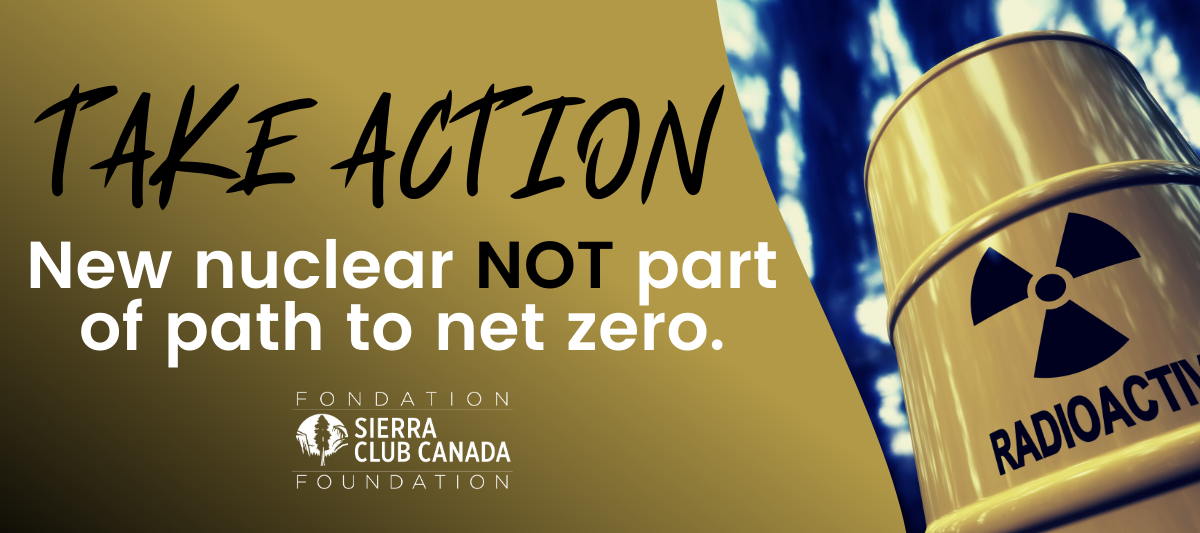
No plan that gets us to net zero in a reasonable time frame includes new nuclear reactors. Nuclear is far too slow and expensive to deal with the climate emergency.
Just like fossil fuel energy, nuclear produces wastes that pose unacceptable health hazards and economic costs. Radioactive wastes from nuclear power plants have been piling up for over 70 years. Canada still has no long-term strategy to deal with either nuclear or fossil fuel wastes.
Building Canada back better means major investments in conservation and renewable energy, providing hundreds of thousands of good green jobs.
Global investment in renewable energy and newly-installed renewable capacity has far surpassed nuclear in recent years. Investors are smart: they put their money where it will yield good returns.
In 2015, the Harper Government handed over operation of Canada's federally-owned nuclear labs to an American-led multinational consortium, currently composed of two Texas-based companies (Fluor and Jacobs) and SNC-Lavalin. The U.S. military-industrial complex is driving the push for new nuclear, hoping Canadian taxpayers will subsidize risky, expensive and largely untried “small modular” reactor designs, including plutonium-fuelled reactors.
In a CBC interview aired on September 19th, Natural Resources Minister Seamus O’Regan said, “We have not seen a model where we can get to net-zero emissions by 2050 without nuclear.”
O’Regan also claimed that net zero “needs oil and gas.”
There seems to be some confusion about time frames here. Transportation and home heating across Canada are heavily reliant on oil and gas. Electricity production in two provinces – Ontario and New Brunswick – is heavily reliant on large nuclear reactors. But implying that this can or should be the status quo until 2050 defies logic.
The 2018 Intergovernmental Panel on Climate Change (IPCC) report says limiting global warming to 1.5°C requires “rapid and far-reaching” transitions in land, energy, industry, buildings, transport, and cities. Human-caused emissions of carbon dioxide need to fall by about 45 percent from 2010 levels by 2030, reaching ‘net zero’ around 2050.
New nuclear reactors cannot be part of a rapid transition. The 2019 World Nuclear Industry Status Report says the average construction time of 63 reactors started since 2009 (37 in China) was 9.8 years. Small modular reactors (SMRs) have been long delayed. NuScale - the leading U.S. design - was supposed to generate power in 2015-16, but latest estimates are that it will be 2029-30 at the earliest.
O’Regan also said: "There are models that we're looking at that would reduce the amount of nuclear waste. There are other models that would recycle nuclear waste.”
Whatever the models predict, the inescapable fact is that all nuclear reactors produce radioactive waste. “Reducing” or “recycling” radioactive waste only creates more radioactive waste, passing the buck to future generations. Worse still, some SMR wastes would be difficult to deal with. SMR designs that use recycled fuel require extraction of plutonium, creating serious national security risks associated with nuclear weapons proliferation.
The only way to deal with wastes from fossil fuels and nuclear is to phase out these technologies.
Canada is dragging its feet on creating a realistic climate plan. We already provide more fossil fuel subsidies per capita than any other G-20 nation. Let’s not compound this by subsidizing the pipe dream of new nuclear technologies.
If you agree that new nuclear is not part of the path to net zero, please sign your letter below to Minister O’Regan and your Member of Parliament. Call upon the federal government to minimize the generation of radioactive waste and to cease all support and taxpayer funding for small modular nuclear reactors.
Thank you for taking action.

